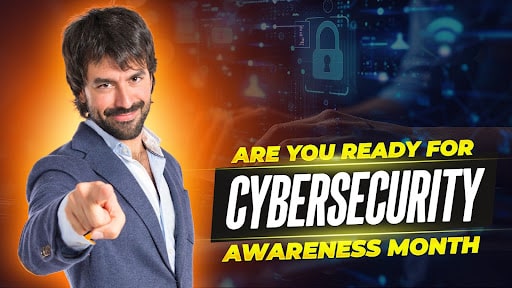
10 Sep Is Your Business Ready for Cybersecurity Awareness Month?
October marks the 22nd annual Cybersecurity Awareness Month. This nationwide initiative reminds both individuals and businesses that digital safety begins with everyday habits.
For small and mid-sized businesses, the message is especially relevant. In 2024, studies found that roughly 95% of data breaches were attributed (at least in part) to human error. When an incident strikes a smaller organization, the financial and reputational fallout can be especially damaging.
These numbers may feel daunting, but progress starts with the right knowledge and simple actions. The good news? Practical steps are within reach for any team, regardless of size or sector. (And if you are one of our clients, you are already a step ahead.)
In honor of Cybersecurity Awareness Month 2025, this guide explores today’s most pressing threats and offers actionable strategies to help your business build lasting resilience. So, let’s dive in.
Phishing is Still a Top Threat
According to the IBM X-Force 2025 Threat Intelligence Index, phishing remains a primary entry point for cyberattacks. Today’s phishing scams are far more advanced than the clumsy, typo-filled emails most people remember. Attackers now utilize generative AI tools to craft highly personalized, convincing messages that mimic those of coworkers, vendors, or financial institutions.
It only takes one employee clicking on a malicious link or sharing login credentials to compromise an entire network. Phishing is often the first step toward more severe attacks, such as ransomware or business email compromise (BEC).
What You Can Do:
- Provide ongoing training and phishing simulations to help employees identify potential red flags.
- Use smart email filtering and spam detection to block suspicious messages.
- Encourage a “pause and verify” culture where staff double-check unexpected requests before taking action.
Password Hygiene Matters More Than Ever
Weak or reused passwords continue to create opportunities for attackers. Cybercriminals often use automated tools that test stolen credentials from one breach across multiple accounts (a tactic known as credential stuffing).
For SMBs, one compromised account can quickly spread through shared systems. Password hygiene is often overlooked, but it is a fundamental line of defense.
What You Can Do:
- Require unique, complex passwords for all business accounts.
- Encourage the use of a secure password manager to reduce the risk of reuse.
- Implement regular password updates and monitor for compromised credentials using breach notification tools.
MFA: A Must-Have Defense
Strong passwords are essential, but they’re not enough on their own. Multi-factor authentication (MFA) provides a critical second layer of protection by requiring an additional step, like a code sent to your phone or approval through an authenticator app.
Cybercriminals are constantly targeting password databases; however, MFA can effectively stop them in their tracks. According to research from Microsoft, MFA can block more than 99% of account compromise attacks.
What You Can Do:
- Enable MFA on all business accounts, especially email, financial systems, and cloud applications.
- Choose MFA methods that balance security with convenience (such as authenticator apps).
- Educate employees on why MFA matters and how to set it up properly.
Ransomware Protection Is Business-Critical
Ransomware attacks have become increasingly sophisticated, targeting not only large enterprises but also smaller organizations with weaker defenses. Once ransomware infiltrates your systems, it can encrypt files, disrupt operations, and demand costly payments.
The manufacturing, financial services, and healthcare sectors are common targets, but no industry is immune. For SMBs, ransomware can mean days of downtime and permanent loss of customer trust.
What You Can Do:
- Maintain regular, tested backups stored securely offline.
- Patch systems promptly to close known vulnerabilities.
- Partner with a cybersecurity team that can provide 24/7 monitoring and rapid response if an incident occurs.
Make Cybersecurity Awareness an Everyday Practice
Cybersecurity Awareness Month is an excellent reminder, but absolute protection comes from year-round commitment. The key is consistency: ongoing employee education, layered defenses, and a culture where security is everyone’s responsibility.
Bytagig helps SMBs turn awareness into action. From phishing simulations and MFA deployment to backup solutions and incident response planning, we ensure your business stays secure without adding unnecessary complexity.
Contact us today to prepare your team for Cybersecurity Awareness Month, and every month after.
Share this post:

Sorry, the comment form is closed at this time.